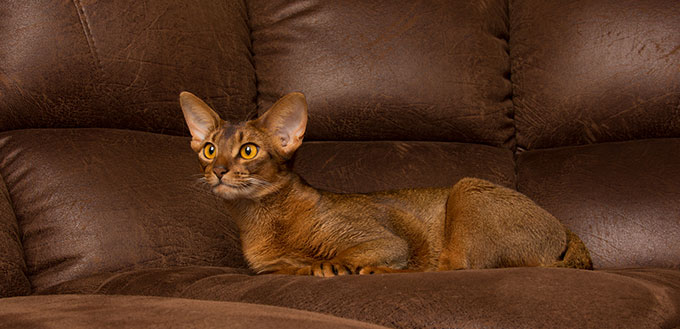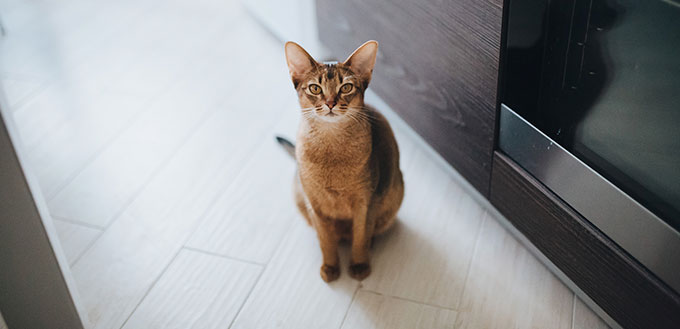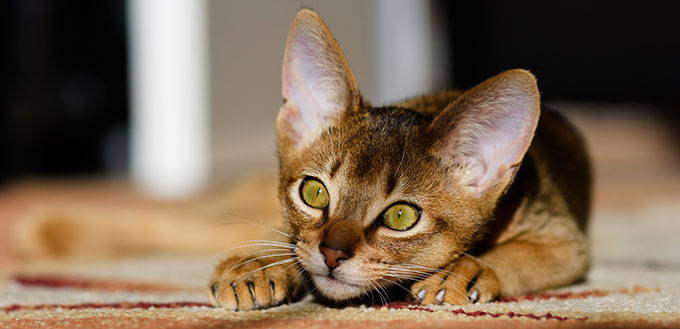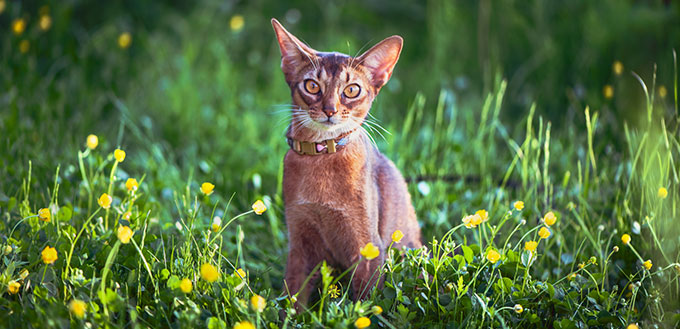Abyssinian cats are amongst the most popular breeds of felines throughout the world. This can be attributed to both their gorgeous appearance and their lovely personalities. They are sleek and athletic cats who have a medium, neat build. An adult Abyssinian will reach around two feet in length and will weigh around six to ten pounds. Their coat is short and silky but very luxurious and can range in color. It could be anything from a thick fur that can be silver color through to cinnamon or golden brown. Some Abyssinian cats are more of a blue-gray color. Their coat appears mottled as each hair is lighter at the base and darker at the tip. Cat Moms and Dads fall in love with their large, almond-shaped eyes which are always alert and expressive.
They can sometimes have a Lynx-like look about them thanks to their large ears and they are highly intelligent cats. They can be independent but can also show great affection to their lucky owners and love to be a part of what is going on with the family. They would be best suited to a family that lives in a larger home with a yard or garden and who are not away for long periods of time.

History of the Abyssinian Cat Breed
No one is totally sure about the origins of the Abyssinian cat. They do bear a strong resemblance to the cats featured on tomb paintings and papyri drawings from ancient Egypt. There are also very similar looking felines resident in North Africa, Asia, the Middle East, and other jungle regions around the world. They were almost certainly introduced to the west by sailors and merchants – notably those from Abyssinia over a hundred years ago.
There has been some recent genetic research that has indicated that the breed we now call Abyssinian actually evolved in Southeast Asia. However, other research points to the African wildcat as the origin. Some breeders are of the opinion that the original Abyssinian line died out and that the breed was recreated by cat breeders in the UK.
The breed’s association with the UK is well known. Dr. William Gordon Stables from Scotland was the first to document a cat from the breed who was called Zula. This particular cat came from the Abyssinian town of Zula and accompanied a naval crew back to the UK after the war in 1868. However, the breed was almost certainly wiped out in the west as part of the devastation caused by World War II.
As for the US, the Abyssinians were not recognized here until the 1900s. They were first exhibited in Boston in 1909 but had no real success until after 1930. A single cat called Ras Seyum was imported to the US in the 1930s and caught the attention of breeders. This led to the increase in popularity of the breed and today they are one of the most popular breeds we have.
Quick Facts About the Abyssinian Cat
- They may not actually be from Abyssinia!
Whilst it is true that some Abyssinian cats were brought to Europe from Abyssinia (which is now called Ethiopia), their origin could be in Southeast Asia. Also, the original breed is thought to have died out after WWII and was resurrected by enthusiastic breeders.
- They are very athletic
Abyssinians are very agile and athletic. They would prefer to live in a large apartment or in a house with a yard or garden so that they can move around. They need constant stimulation and attention. Abyssinians love to run and climb and are capable of jumping six feet up in the air! They will also walk on a leash and perform tricks if you teach them correctly.
- They are not the best choice as a show cat
If you are looking for a cat that will compete in cat shows, the Abyssinian may not be the best choice for you. Even though they are very beautiful and intelligent cats, they tend to be very shy around strangers. They don’t even like other cats that they are not used to!
- They have very big ears
Abyssinians have an excellent hearing because they have larger ears than many other cats. However, you do have to look after them. Check them on a regular basis and clean them if needed. Wax can build up in the ears which can lead to infections. Also, cats can get ear mites which can cause all sorts of problems. Prevention is always preferable to cure when it comes to ear problems.
Find out more about Cat Ear Cleaner.
- They have big personalities
Abyssinians may not be the largest breed but they have big personalities. Obviously, all individuals are different but in general, they are loyal and loving cats. They seek out companionship from humans but it will be on their terms. They may not like to sit on your lap but they are highly intuitive. They will know how you are feeling and will do their best to cheer you up when you are down.

Things You Should Know About the Abyssinian Cat
Inviting any breed of cat to live in your home with you is a big commitment. You should do your research first to make sure that you can look after them properly. Abyssinians can make wonderful pets and companions but they may not be suitable for the composition and lifestyle of all households. Here are some of the main things that you need to know before you decide to take on an Abyssinian cat yourself.
Health
You can expect your Abyssinian to live for between 12 and 16 years but they will require the correct care to enjoy a long and healthy life. It is essential that they receive the appropriate vaccinations and are fed the correct diet.
In general, they are a very robust and healthy breed. However, there will be some conditions and diseases that you need to look out for. Here are the most common ones.
- Gingivitis: This is the early stage of periodontal disease and is an inflammation of the gums. The pocket between the teeth and the gums is called the gingival sulcus. A buildup of plaque in this area can result in bacteria multiplying in this space and destroying gum tissue. There will be swelling and redness and eventually a loss of teeth and difficulty feeding.
- Progressive retinal atrophy (PRA): This is a condition that affects the cells of the retina at the back of the eye. One form of the disease starts at around two to three months of age and another develops in adult cats. Both lead to a loss of sight. Abyssinians are the only breed in which this is an inherited problem. Thankfully, as a result of responsible breeding practices, it is now very rare but is still something that you should enquire about as it is a devasting condition.
- Amyloidosis: This condition is caused by abnormal proteins being deposited in organs of the body, commonly the liver. The result is organ failure, chronic disease, and death. It usually develops at around one to five years of age and is progressive; in some cats, there is a rapid deterioration but in others, it is slower. It is more common in Siamese and Abyssinian breeds than in other cats but is reported less often now than in previous years.
- Pyruvate kinase deficiency (PK): This is another inherited disorder that causes anemia because the red blood cells become unstable and fall apart. It can develop at various ages and can present as lethargy, weakness, and weight loss. The gene that causes the problem is most often found in Abyssinian and Bengal cats, as well as a few other breeds, and genetic screening, is available for this condition.
- Patellar luxation: The patellar is the knee cap and when luxation occurs it moves out of its normal position. It is usually found on the inside of the knee but can move to the outside. It is an inherited condition in Abyssinians and affects both hind legs. It causes limping, a type of gait called ‘bunny hopping’ and total hind-limb collapse. Often it can be corrected with surgery.
- Sensitive skin: This is also referred to as Feline Hyperesthesia or twitchy cat syndrome. You will notice that the skin on your cat’s back ripples and they may suddenly jump as if something has touched them. It can happen in their sleep and they may try to bite and lick their back. You may notice muscle spasms and twitching. In severe cases, your kitty can appear to hallucinate and its pupils may dilate. Some cats even self-mutilate and bite, chew, and scratch their own bodies. This will result in hair loss, skin lesions, and possibly skin infections.

Feeding
When you first pick up your Abyssinian kitten from the breeder, it is important that you stick to the same diet that they have been receiving. Sudden changes in diet can cause stomach upsets in cats. If you do decide to transfer them onto another food, you need to do it gradually. Mix a little of the new food in with their normal food, to begin with, and then gradually change the proportions.
Abyssinians need premium cat food with plenty of high-quality protein from meat sources. They also need omega oils and a range of vitamins and minerals to support overall health.
It is best to choose a food that does not contain artificial additives as these can cause allergies. Abyssinians can do well on wet or dried food but, if your cat does not drink a lot of water, you may feel that wet food is more appropriate and will help to prevent dehydration.
It is not common for Abyssinians senior cats to be very fussy with food but you still need to continue with a high-quality diet. You may need to feed a mature cat several times a day to make sure that they get adequate nutrition. Watch out for the total calories that they are ingesting. As they get less active, you may need to adjust their diet to prevent obesity which will bring a whole range of unpleasant health issues.
Check out our guides on the Best Cat Foods for Weight Loss and Best Senior Cat Foods.
Care
You can do a lot to help your Abyssinian beauty lead a long and happy life. Diet, exercise, and regular veterinary care are crucial.
Also, supervise your cat and protect them from hazards that could cause them harm. This may mean that you have blocked off certain rooms in your house and removed objects and substances that are harmful. Abyssinians need regular play sessions that satisfy their instinct to hunt and their need to explore. If their mind and body and kept busy, they are less likely to develop behavioral issues so stock up on games, puzzle toys, and balls for when you are out and be prepared to join in the fun when you are at home. A lack of mental stimulation can lead to depressive moods and destructive behavior in this breed. If you are looking for more options, check out our guides on the best cat toys and best interactive cat toys.
Abyssinian cats are meticulously clean and simply will not tolerate a litter box that is anything other than spotless. Make sure that you have one litter tray for every cat and remove soiled litter as soon as you can.
It is also important that your cat gets enough to drink as they can become dehydrated. Cats can be very fussy about what they drink from so choose a water bowl with care; cats prefer ceramic and metal to plastic. You may need to add ice cubes to the water, especially on hot days. A better option may be to invest in a water fountain. This delivers running water which is preferred by most cats.
Grooming
This is not a breed that you will have to spend hours grooming. They have a neat, short coat that requires very little input from you. Your kitty will look after it themselves with regular washing sessions! Nevertheless, it is a good idea to give their coat a weekly groom. You can use a soft brush or chamois leather. This will remove dead hair and leave the coat with a nice sheen. Abyssinians love to be groomed by their human friends. They are very likely to show their appreciation with loud purring. They will shed most in the Spring and Fall so this is when they will require the most frequent brushing.
Abyssinians can suffer from serious problems with their teeth. You need to take some steps to help prevent dental issues. It will be very useful if you can get your cat used to having their teeth brushed. You need to use a cat toothbrush that is specially designed for cats and that has soft bristles. Be positive and confident but keep the sessions short. You can also gently massage the gums with your finger. You can buy toothpaste just for cats. Don’t ever use human toothpaste as it will upset your cat’s stomach.
Temperament
Abyssinians are full of personality and love interacting with their human family but it has to be on their terms. You may find that your Aby wants to be involved with everything that you are doing, whether it is convenient for you or not! Because they are so people-oriented, they should not be left alone for long periods. They will become lonely and bored and this can lead to separation anxiety and behavioral issues.
This is a fearless breed that yearns for adventure and likes to go exploring. Sadly, this can sometimes lead them into dangerous situations and they can get into trouble if they are not correctly supervised. Abyssinians tend to escape and wander around the neighborhood and this may lead to concerns that they are lost. They don’t like to be very confined so if you live in a small, high-rise apartment block, this may not be the best breed for you. You will find that your kitty is very playful and affectionate and will do its best to cheer you up when you are feeling down.
On the downside, some Abyssinians that have been poorly bred can be a little unstable. This makes them very nervous, shy, and fearful and this can prove to be a problem for their owners.

The Last Word…
Abyssinians are gorgeous cats with an athletic appearance and large expressive eyes. They look a little like a Lynx and, like their wild cat ancestors, they love to roam and explore. This makes them best suited to homes that have yards and gardens.
They require little in the way of grooming but dental hygiene should be a priority. They can also suffer from inherited conditions so only source your pet from a reputable breeder. Once you have your Aby back home, they will love to interact with you and be a part of everything that you do!
Sources:
- Abyssinian, Pet MD
- About the Abyssinian, CFA





